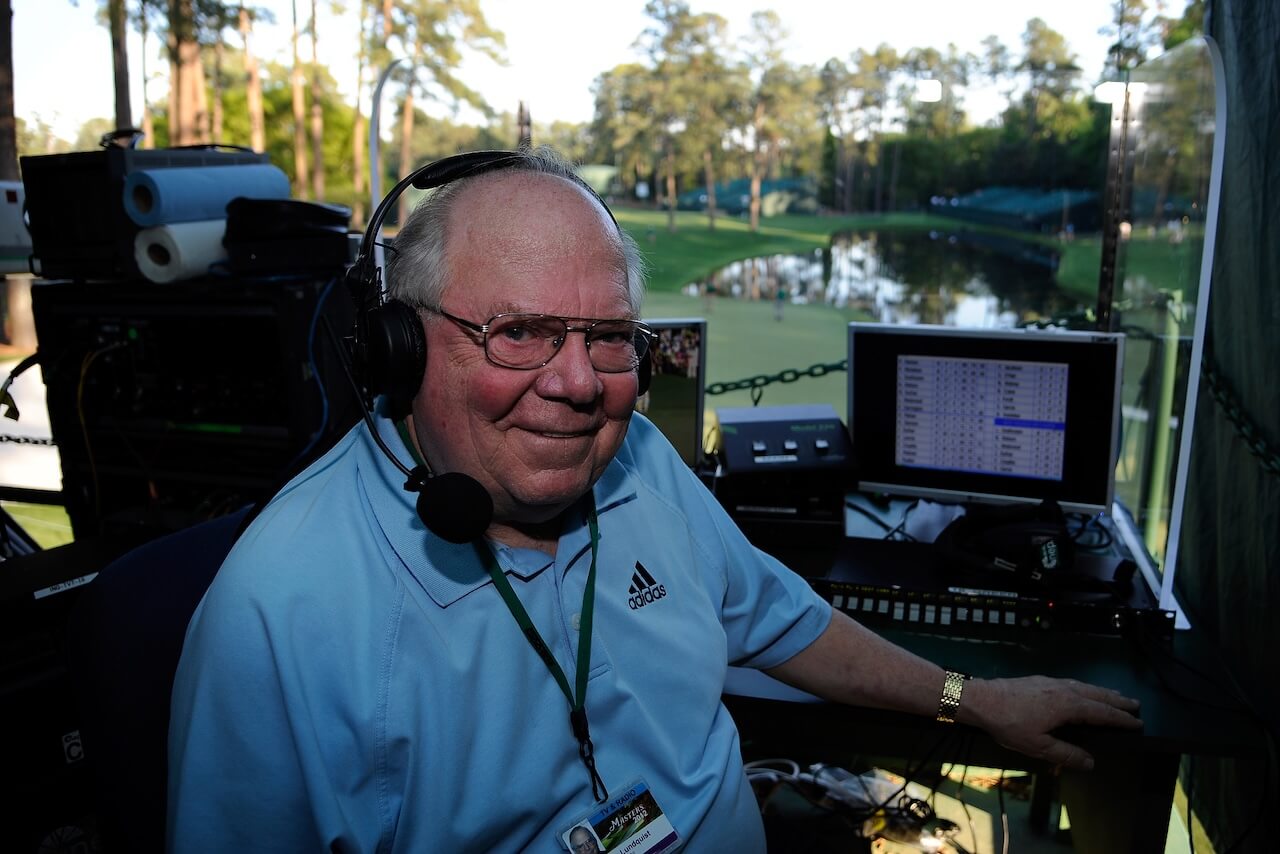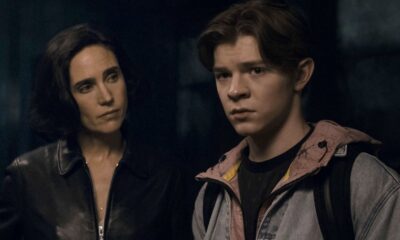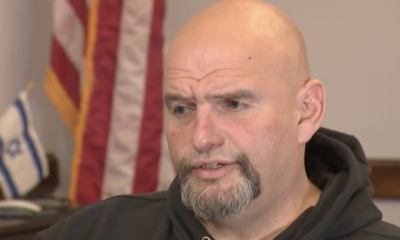Sports
In Verne Lundquist’s final Masters moment, the hour was his

Of course you know the phone calls. Verne Lundquist provided the soundtrack to so many iconic sporting moments, from Jack Nicklaus’ birdie putt on the 17th hole at the 1986 Masters (“Yes sir!”) to Christian Laettner’s jumper at the buzzer during the 1992 NCAA Tournament (“Yes!”) after Tiger Woods’ famous chip at number 16 during the 2005 Masters (“In your to livehave you seen anything like that?!”) to Auburn’s kick-six in the 2013 Iron Bowl (“An answered prayer!”). So much more.
But here’s something you might not know: On the night of November 22, 1963, Lundquist was just a 23-year-old weekend television sportscaster and afternoon disc jockey at KTBC-AM-FM-TV, an Austin, Texas, radio television station owned by Lyndon Johnson and his wife. LadyBird. That evening, he volunteered to drive CBS News correspondent David Schoumacher and two other CBS staffers the 60 miles from Austin to Johnson City so they could interview friends, relatives and high school classmates of Johnson, who would soon become president of the United States. He never forgot that night. How could you?
But my favorite Verne story is how he met his wife Nancy. It’s one he told me years ago for a Sports Illustrated piece. Here it is, in his own words:
We met at a bar – and I hasten to add it was a fancy bar in Dallas. It was a place called Arthur’s. I came in after doing the 10 o’clock news (on WFAA-TV in Dallas) and I just didn’t want to go home. Nancy and her date were sitting at the bar and her date recognized me from local television and invited me for a drink. He introduced me to his date and her name was Nancy Miller. It was their first date, a blind date. So we were chatting and her date, Raymond Willie, said to me, “Listen, I know you’re single. I’m going to set you up with a friend of mine and then we can all go to dinner.’ He looked at Nancy and asked her, “What are you doing Thursday night?” She said, “Nothing.” He said, “Great, you’re my date and we’ll set Verne up with this schoolteacher friend of mine and we’ll go out for dinner.” Meanwhile, I look at Nancy and think she is the most beautiful thing I have ever seen in my life. So Raymond finally left to take care of his business and I asked Nancy, “So, how involved are you with Raymond?” She said, “Oh, this is our first date and it’s a blind date.” So I said, “Well, forget what he’s talking about on Thursday night. What are you doing Saturday night?” She said, “I guess I’ll do whatever you do.”
On Sunday afternoon, Lundquist stopped by CBS Sports for the final time after earning his 40th Masters, a nice round number that he said was the way to go out at age 83.
“(CBS Sports chairman) Sean (McManus) and I had a conversation a few years ago about what would be the right time to exit stage left, and he and I agreed that 40 had a nice round feel and that we would be leaving the Masters and CBS at the end of the second week of April this year,” Lundquist said during a recent conference call. “I have so many wonderful memories of our visits to Augusta.”
It was an emotional week at Augusta for the CBS Sports staff due to Lundquist’s retirement and McManusand Lundquist got so many flowers from different places this weekend, including Augusta National, ESPN, The Washington PostAnd Golf overview. CBS Sports paid tribute with Verne and Nancy standing on the hole where we often heard him – No. 16.
“Have you seen anything like this in your life?”
When it comes to Verne Lundquist’s legendary career, the answer is no.
After 40 years at Augusta National, he bids a fond farewell to the Masters. pic.twitter.com/9ZQSaKtPd5— Golf on CBS ⛳ (@GolfonCBS) April 14, 2024
“They celebrated their 42nd wedding anniversary this week at the Masters,” host Jim Nantz said of the couple as CBS emerged from the video tribute. “And we’ll celebrate you as long as there’s a Masters tournament, Verne Lundquist.”
Lundquist already had a successful career before reaching the networking level. He was the radio voice of the Dallas Cowboys from 1972-84 and the sports director of WFAA-TV in Dallas. The job at “SEC on CBS” was the first as a broadcaster for Lundquist, who has also worked for ABC Sports and Turner Sports in addition to CBS. McManus offered Lundquist the play-by-play role for SEC football in 2000, which quickly became a big deal due to the SEC’s national explosion. It also changed the way sports fans saw him.
“(CBS) lost the NFL to Fox in 1994, and I stayed at CBS for a year after that, and then a great guy, the late Mike Pearl, who was our executive producer of the Olympics, went to Turner Sports and invited me to come over there and I did that for two years,” Lundquist said. “I’ll never forget when we were in Nagano, Japan, and CBS had reacquired the rights to the NFL. Sean came to me…before the men’s (figure skating) championships. We had about six or seven minutes to talk, and he tapped me on the shoulder and said, “Are you ready to come home?” That’s probably the biggest question I’ve ever been asked in my life. So I came back and of course I returned to the Masters rotation. It was a great run. Hello, I am 83 years old. I have been blessed with a sensational professional life and an amazing personal life. I wasn’t the first to say this, but thanks for the memories.”
In 2016 I did traveled to Baton Rouge to watch Lundquist and the CBS SEC football group are working on Lundquist’s final season. What I personally saw was how much the people around him cared for him. He was 76 at the time and the crew cared for him as if he were a father figure.
“He’s the exact same Uncle Verne I knew in 1985, the first time I met him,” Nantz said. “Of course, I knew him very well before I joined the CBS team. We were assigned to a Christmas Day football game (the Blue-Gray Football Classic) in 1985. I was in my mid-20s and found myself working on a show with Verne Lundquist. That’s really big. I was nervous about it. The night before the game, Verne and Nancy invited me to dinner, which meant a lot. I think in a lot of ways this showed me what the CBS culture was about, how to act as a teammate. … Verne was already subconsciously guiding me at the time on how to be inclusive, be kind, be caring and treat people like family. It meant a lot.”
It was wonderful to hear Lundquist’s call one last time as Ludvig Åberg, Max Homa, Collin Morikawa, and Scottie Scheffler each reached No. 16 in the hour of 6:00 PM ET. At 6:30 p.m., as Morikawa and Scheffler received great applause from the crowd walking No. 16, Nantz said, “And Verne, that crowd might as well be standing for you.”
There was Verne with a final birdie call as Scheffler took a four-stroke lead.
“The hour belongs to Scottie Scheffler,” Lundquist said as the eventual Masters champion left the hole, but he really could have been talking about himself.
Verne, thanks for the memories. pic.twitter.com/pUB5nTPWk9
— Golf on CBS ⛳ (@GolfonCBS) April 14, 2024
How can women’s basketball maintain TV momentum in the post-Caitlin Clark era? Here’s my piece on it.
Three sports media podcasts that may interest you:
• A conversation with Flora Kelly, ESPN vice president of brand strategy and content research. Kelly explains her role at ESPN, how it informs the company, how her research team works and the macro trends she sees in sports in 2024.
• A conversation with James Andrew Miller, bestselling author of books on CAA, ESPN, “Saturday Night Live” and HBO. Miller discusses ESPN’s Norby Williamson, who, during his nearly four decades at ESPN, owned nearly every part of ESPN’s content and business areas from programming, production and news.
• A conversation with Jon Lewis, the founder and editor of Sports Media Watch. Lewis discusses viewership for the women’s and men’s tournaments.
Some things I read this past week that were interesting to me (note: there are a lot of paywalls here):
• The best piece I read this month – Forsaken: 14 years, 140 officers and a dark secret that consumed a small town in Ontario. How the Lucas Shortreed case was solved. By Jon Wells of The Hamilton Spectator.
• Kentucky accused of “complicity” because former swimming coach allegedly committed sexual assault. By Katie Strang from The Athletics.
• A narco-uprising brings a once peaceful country to the brink. By Samantha Schmidt and Arturo Torres of The Washington Post.
• Masters of the Green: Augusta National’s black caddies. By Latria Graham of Garden and Gun.
• OJ Simpson’s Hall of Fame spot may be assured, but there’s no rule against certain contexts. By Jonathan Jones of CBS Sports.
• What happens when a generation of sports fans is consumed by gambling? By Steve Buckley of The Athletics.
• A behind-the-scenes look at Amazon’s quest to crack Trader Joe’s – and dominate it all. By Dana Mattioli of The Wall Street Journal.
• To build muscle, it’s the sets that count. By Alex Hutchinson of Outside.
• America’s next soldiers will be machines. By Jack Detsch of Foreign Policy.
• Fifty years later, Henry Aaron’s legacy lives on in Atlanta and beyond. By Michael Lee of The Washington Post.
• A vigilante hacker has taken down North Korea’s internet. Now he takes off his mask. By Andy Greenberg of Wired.
• Test your training IQ The New York Times
• The most important detail missing from the story about OJ and race. By Joel Anderson of Slate.
• Caitlin Clark delivered a winning segment on “Saturday Night Live.”
• Did one man just stop a massive cyber attack? By Kevin Roose of The New York Times.
• How AI can transform baseball forever. By Josh Tyrangiel of The Washington Post.
• What happened to the damages OJ Simpson owed to the victims’ families? By Anna Betts of The New York Times.
(Photo of Verne Lundquist at Augusta National Golf Club in 2012: Augusta National/Getty Images)











